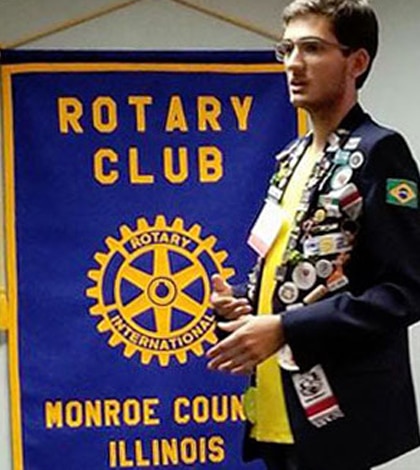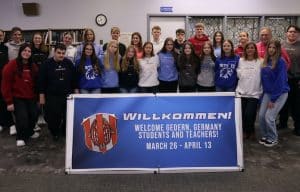Brazil exchange student enjoyed local stay

João Dias, a foreign exchange student from Brazil, came to Waterloo through Rotary International. (submitted photo)
People often say there’s nothing more American than eating apple pie or watching a baseball game.
But for João Dias, a foreign exchange student through Rotary International, the time he felt most American was at another sporting event.
“My first football game, whenever the football players came out, the cheerleaders came out and the marching band was playing I just felt so in on the culture and the whole experience,” Dias said.
Dias came to America during the first week of August 2017 to complete his senior year at Waterloo High School. But the process for being an exchange student started much earlier.
Dias started working toward being a foreign exchange student in May 2016. It was a long process, but a milestone in that process involved a test.
The application process for the Rotary Youth Exchange Program, which Dias came to America through, is different for each country.
In Brazil, Dias had to take a test that would determine the priority given to prospective students for selecting a location for them to live.
Dias, who previously attended high school at Colégio Paroquial in his hometown of Paranavaí in Brazil, placed 10th out of 22 students. He chose Waterloo as his destination.
He said he wanted to be a foreign exchange student to learn about another culture.
“I wanted to just experience the culture of another country,” explained Dias, whose father has been a Rotarian for 25 years. “I wanted to make my English better. I wanted to make new friends.”
Now, his time in America has come to an end as he returns to Brazil.
Dias said he has enjoyed the experience of being in the U.S.
“I had a chance to enjoy this feeling of American high school,” he said. “I went to the football games, homecoming, prom and this kind of stuff that you see in the movies.”
Timothy Gutknecht, assistant governor of the three local Rotary clubs, said this provides part of the reason for the program.
“Cultural exchanges help lead to world peace and better relations between other countries,” he said. “And they also provide students with more experiences to make them more well rounded.”
To help round out Dias, he went on a number of trips during his time in the U.S. He has visited Chicago, Kansas City, California, Nevada, Arizona and New York.
Of all the places he has been, he said the west coast is his favorite.
“It was more fun,” Dias said. “I went with a group of exchange students. We had a whole bus of exchange students from around the U.S. So it was fun to be with them. And, plus, the places are amazing.”
When he wasn’t traveling, Dias lived with two host families from Waterloo.
He has spent the past eight months with the Bourgeois family.
“It’s been a very positive experience,” Trish Bourgeois, the mother in the family, said. “We have learned a lot about another culture, which is great. His personality fit into our family well. Plus, he has a different view of America so we’re seeing America through his eyes.”
To become a host family, Bourgeois said her family had to get background checks, fill out forms and allow someone to inspect their house to ensure they could provide good living conditions for Dias.
“It wasn’t too bad because we went through Rotary and they’re well established,” said Bourgeois, who is a member of the Rotary Club of Monroe County. “It was really pretty painless.”
Although that process was painless, Bourgeois said the family had to adjust to having Dias in their family.
The same holds true for Dias on a larger scale. He said one of the hardest cultural differences to get used to was the slowness with which Americans form relationships compared to Brazilians.
On a similar note, Dias said he believes Americans should be more like Brazilians when it comes to greeting people.
“We hug a lot,” he said. “I think hugs are nice. You should start hugging more instead of just saying hi and hello for people.”
On the other hand, Dias said he has learned valuable lessons from his stay in America.
“You learn to be more patient,” he said. “You’re in a culture you don’t know. You don’t really know how people live and how you’re supposed to act. After a while you learn everything and you just fit in and do everything automatically.”
Even with Dias having to adjust to American life, Bourgeois said he has made the experience of being a host family worthwhile.
“Having the relationship with someone from another country has been great,” she said. “Our immediate family learning about another country has been good. João is a really good person. We feel like he’s really enhanced our lives with his sense of humor, intellect and just opened doors to a good relationship.”
Gutknecht echoed those sentiments when it came to working with Dias.
“He’s the ideal exchange student,” said Gutknecht, whose son went to Brazil as an exchange student previously. “He’s very bright and very sociable. He didn’t cause any trouble at all.”
Dias, Bourgeois and Gutknecht also all said they would encourage anyone who is considering becoming either a foreign exchange student or host family to take that step.
“We were a little shy and kind of reluctant about doing it just because we had never done it,” Bourgeois said. “And our whole family is glad that we did it. If anybody’s thinking about it ever, they just need to go for it.”
For more information about the Rotary Youth Exchange Program, visit www.rotary.org/en/our-programs/youth-exchanges.






